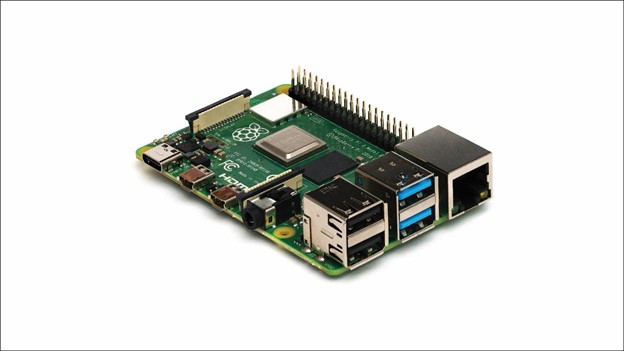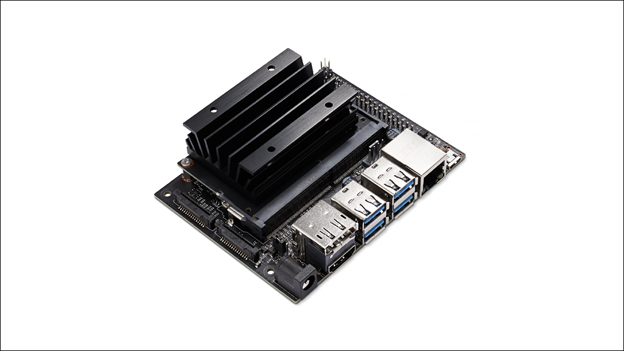If you are uncertain about whether to go with Raspberry Pi or Jetson Nano board, follow this article to see a detailed comparison of both these boards. This will help you select the one according to your needs.
Raspberry Pi vs Jetson Nano
Here, we will provide a detailed discussion of both these boards.
Raspberry Pi
The Raspberry Pi is a credit card size single programmable board that comprises of all necessary interface modules used for robotics, home automation, edge computing, and industrial application. Additionally, it can perform all the operations you would expect a desktop computer to perform, for example, playing video games, creating, and editing videos, document editing, and internet browsing.
It has a quad-core 64-bit ARM Cortex-A72 CPU with a clock rate of 1.5 GHz which is sufficient to run a lightweight operating system. Besides the device also has different RAM size versions of 2GB, 4GB and 8GB that helps users to smoothly run the operating system and parallel tasks simultaneously.
The I/O interface consists of HDMI, USB, Display Serial Interface, and Camera Serial Interface supporting 4K 60fps video with dual screen functionality. Additionally, a 3.5mm jack port on Raspberry Pi can easily be configured for audio and video purposes.
Jetson Nano
The Nvidia Jetson Nano is a compact and powerful board that has an embedded system on a module developer kit. This kit originated from the Nvidia family and provides computing solutions for AI, IoT, and Robotics applications.
The Jetson Nano kit has a 128Core Maxwell GPU at 921Mhz, which is good enough to run different AI and ML-based applications. It has a Quad-core ARM Cortex-A57 64-bit processor with a clock speed going up to 1.43GHz. This processor is good enough to run different lightweight operating systems on the board. The 4GB-LPDDR4 RAM is effective in running different desktop applications on the system.
Different I/O interfaces such as GPIO, USB and HDMI ports are utilized to perform different functions for robotics, audio/video, and high graphical gaming. Moreover, Jetson Nano accelerated with a neural network to stream and utilizes the most well-known AI frameworks currently available today, which includes PyTorch, Caffe, TensorFlow, and MXNet.
Specifications
A comparison is being made to differentiate the specifications between Raspberry Pi and Jetson Nano.
| Sr # | Name | Raspberry Pi | Jetson Nano |
|---|---|---|---|
| 1 | Processor | Quad Core Arm Cortex A75-CPU @ 1.5GHz | Quad-Core ARM Cortex-A57 64-bit @ 1.43 GHz. |
| 2 | Memory | 2GB to 8GB SDRAM for different versions of Raspberry Pi | 2-GB or 4-GB LPDDR4 RAM |
| 3 | Display | Support high resolution 4K 60-fps through two Micro-HDMI ports. | HDMI 2.0 and displayPort for 4GB version. 2GB version has HDMI only. |
| 4 | I/O Interface | 2 x USB 3.0 2 x USB 2.0 2x HDMI. 1 x USB C-Type for input power, 1 x 3.5-mm jack. 1 x Camera Serial Interface (CSI). 40 x GPIO pins. 1 x Display Serial Interface (DSI) |
40 x GPIO pins. 2 x MIPI CSI-2 DPHY. 4 x USB 3.0 1 x USB 2.0 2 x HDMI 2.0 1 x DisplayPort. |
| 5 | Ethernet | Gigabit Ethernet Bluetooth and Wi-Fi |
The 2GB Jetson Nano have Gigabit Ethernet and USB 802.11ac. 4GB Jetson Nano have Gigabit Ethernet and Wi-Fi support. |
| 6 | Operating System (OS) | Raspbian, Ubuntu, OSMC, and RetroPie. | Linux4Tegra. |
| 7 | Price | 2GB to 8GB prices ranges from 35$ to 75$. | 2GB for 59$ 4GB has 100$ |
Similarities and Differences
According to the above specifications, the Raspberry Pi and Jetson Nano have few similarities such as same number of GPIO pins, can run an operating system, HDMI display, WiFi/Ethernet modules and I/O Interfaces. Additionally, both can be used for text/video editing, interface with sensors, and robotic purposes.
The major difference between both modules is their Graphical Processing Unit (GPU). The Jetson Nano utilizes a high-performance GPU (Maxwell-128 core @ 912MHz) as compared to the Raspberry Pi (Cortex A75 @ 700MHz), thus, Jetson Nano is more suitable for running high end applications in the field of AI, ML, robotics and more. On the other hand, Raspberry Pi is effective for running several lightweight operating systems and has good support for running desktop applications.
Advantages of Raspberry Pi over Jetson Nano
The Raspberry Pi processor consumes less power than Jetson Nano because of its simple GPU onboard. It’s a good choice for the users who want to start learning different programming languages, such as Python, C, C++ and more. You can also utilize the Raspberry Pi services to perform machine learning, image processing and IoT related tasks as well. While Jetson Nano is mainly developed to offers high computational tasks, thus, utilizes more power and electricity.
Advantages of Jetson Nano over Raspberry Pi
The 128-core Maxwell GPU of Jetson Nano supports full graphic content, which can be utilized for deep-learning processing. It can process multiple video streams that can go up to 1080p video feeds at a time. While Raspberry Pi uses an on-chip graphic processing units, which isn’t capable of processing that much high computational tasks.
The HDMI 2.0 and Display ports are supported by the Jetson Nano and can be utilized simultaneously. While Raspberry Pi can only use either HDMI port or display interface. Jetson Nano has a greater number of ports as compared to Raspberry Pi, which can be useful for the users to attach multiple peripheral devices with the board.
Jetson Nano comes with parallel computation for neural network, so it can be considered as the best product for Artificial Intelligence learning.
Conclusion
This article relates the comparison between Raspberry Pi and Jetson Nano in terms of specifications, differences, and similarities. The Raspberry Pi could be an excellent choice for IoT, robotics, and gaming while Jetson Nano is a suitable candidate for high-performance gaming and videos as well as machine learning and AI for industrial purposes.


